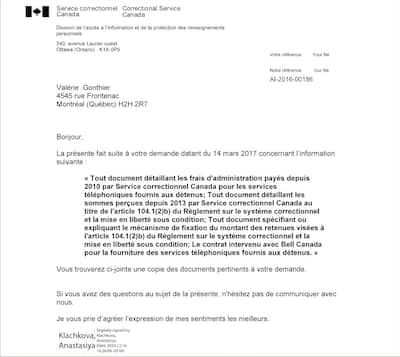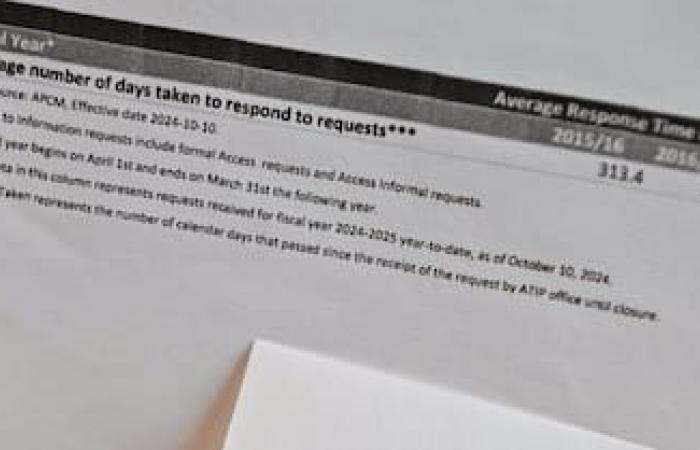Some federal departments take more than seven years to respond to access to information requests. And these interminable delays are not anecdotal since the 30-day deadline provided for by law is almost never respected, reveal data from ten ministries obtained by The Journal.
• Also read: Delays in federal access to information requests: the commissioner admits that her organization lacks teeth
The examples identified through the Access to Information Act from the 10 most frequently requested ministries is enough to raise eyebrows, because the deadlines are measured in years rather than weeks.
For example, in 2024, National Defense took an average of 492 days to respond to access to information requests. In 2023, Environment and Climate Change Canada took 476 days to provide a response to a single request. In the last three years, this same ministry has presented delays of two to three years (see box below).
The average response times from ministries often exceed 100 days.
Stevens LeBlanc/JOURNAL DE QUEBEC
Another clear example of these delays: representatives of the Journal even recently received responses from Correctional Services Canada to requests dating back to… 2017 (see other text below).
However, the law provides that federal institutions have 30 days to respond to a request for access to information or personal information.
A real farce
At the Professional Federation of Journalists of Quebec (FPJQ), we believe that this problem, denounced on numerous occasions, is a sign that this law must be reviewed from top to bottom.
“It’s made it ridiculous. People laugh at people, that’s what’s a shame. This law has become a farce,” laments Éric-Pierre Champagne, president of the FPJQ.
Éric-Pierre Champagne, President, Professional Federation of Journalists of Quebec
Photo taken from the FPJQ website
“The delays are extremely long and that’s when we have answers,” he adds.
A modernization of the law is planned for 2025, but with the current political context, there is reason to question whether it will be achieved.
“I think nothing will happen in 2025. All this will be postponed, I would be very surprised if it became a priority,” denounces Mr. Champagne.
Horror stories
Questionable refusals and completely or largely redacted responses are also increasingly common. In February 2024, The Journal published a file bringing together the horror stories of its journalists with access to information.
The only possible recourse is to contact the Office of the Information Commissioner of Canada. But engaging in such a procedure does not guarantee anything, apart from even longer delays.
The lawyer specializing in access to information, Me Michel Drapeau even believes that complaints lodged with the commissioner can rather be used by institutions that do not respect the law.
“The institutions are asking for an extension [de délais] which makes their lives easier and they know very well that the only choice available to you is to file a complaint. And if you file a complaint, you will have an even longer delay in receiving the results requested from the institution,” he laments.
Endless delays
In 2024 (until October 3), the average days to receive a response to an access to information request was 492 days.
Presents the worst delays. Recently in 2023, a request presented a delay of 476 days. Several presented delays of up to two years in the last three years.
In 2019, one request presented a delay of 1729 days. In 2018, one request presented a delay of 1648 days. The worst was in 2014, with a delay of 1892 days.
- Canadian Security Intelligence Service:
A request took until 842 days for the year 2023-2024.
- Correctional Service Canada:
From the year 2015-2016 until October 3, 2024, the ministry calculated an average of 269 days to respond to access to information requests
- Immigration, Refugees and Citizenship Canada:
Since 2022-2023, an average of 227 days.
Answers almost 8 years later
Correctional Service Canada recently responded to two access to information requests made almost… eight years ago.

Valérie Gonthier / JdeM
One March 2017, The Journal had wanted to obtain information regarding the costs relating to the canteen and telephone services provided to prisoners. We wanted to obtain documents dating back to 2010.
And it was only in the last few days that an employee from the Access to Information and Protection of Personal Information department of Correctional Service Canada contacted us to send us the said documents. It is more than 300 pages, partly written in English. There we find letters, contracts, and various tables including data going up to… 2016.
Moreover, there is no mention in the email sent by Correctional Service Canada of the more than unreasonable response time.
The Journal also received a response on December 18 from the same organization concerning a request dating from April 2017.
We then wanted to obtain the number of suicides and attempted suicides occurring in federal penitentiaries, by province, between 2005 and 2015.
The response, which fits on a single page, contains the two requested tables without any explanation about the very long delay.
– Valérie Gonthier and Nicolas Lachance
Answers only in English
Several federal departments sent responses to access requests from the Journal in English, while all correspondence was written in French. Despite several requests to correct the situation, only one institution has rectified the situation, Correctional Service Canada.

Some responses were sent only in English.
Stevens LeBlanc/JOURNAL DE QUEBEC
The lawyer specializing in access to information, Me Michel Drapeau has been campaigning for years for an investigation to be carried out by the auditor general in order to find what is wrong in the application of “this constitutional right that is regularly flouted”.
“Do we have enough staff to meet demands? Or are there systemic problems,” asks Me Flag.
– Catherine Bouchard
Do you have any information to share with us about this story?
Write to us at or call us directly at 1 800-63SCOOP.









